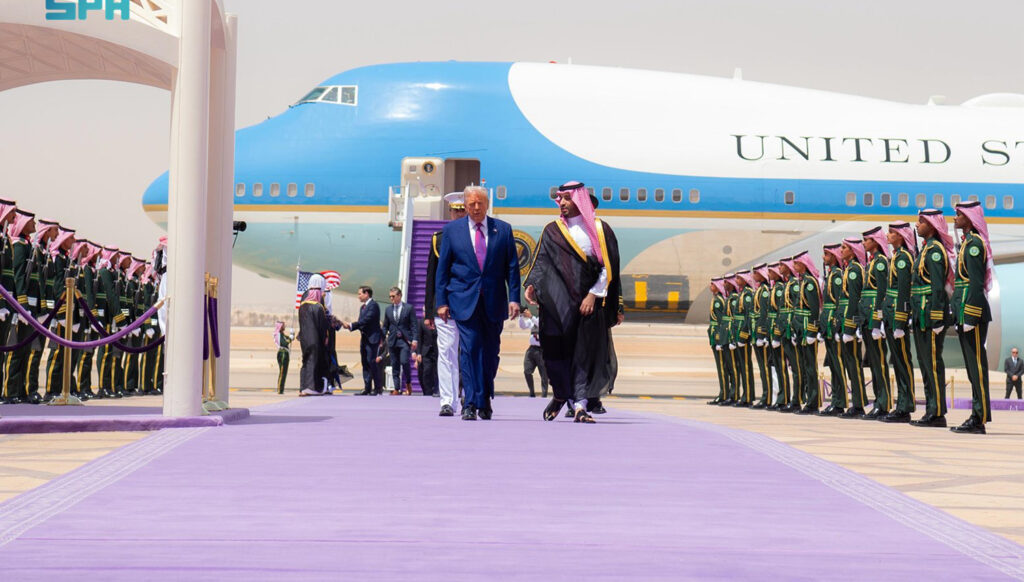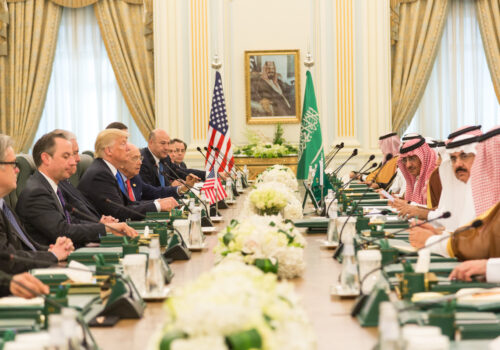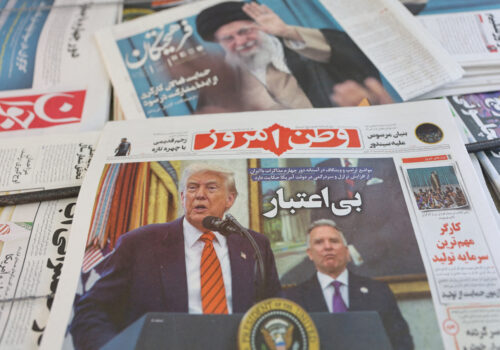There has never been a US presidential visit to the Middle East like this one.
This week, success will be measured not in conventional diplomacy, peace deals, or arms sales, although Donald Trump did make some news by lifting sanctions on the Syrian leadership, urging Saudi Crown Prince Mohammed bin Salman to join the Abraham Accords by normalizing relations with Israel, and agreeing to a $142 billion weapons package for Riyadh.
What sets Trump’s visit apart is the greater focus on the hundreds of billions of dollars of new Middle Eastern investments into the United States ($600 billion from Saudi Arabia alone). Gulf partners will measure success by the Trump administration’s willingness to lift restrictions on the sale of hundreds of thousands of advanced semiconductor chips to the United Arab Emirates and Saudi Arabia. Trump will also measure success by his ability to outmaneuver China in securing a closer relationship with Gulf monarchies than the Chinese have, even though Beijing is their biggest fossil-fuel customer.
It’s not that Middle East security threats or peace negotiations have gone away. There’s the war in Gaza, and this week’s release of the American hostage Edan Alexander. There are new efforts to rein in Iran’s nuclear-weapons potential through negotiations. And there’s Trump’s dream of finding a path to Saudi-Israeli diplomatic normalization (and ongoing progress toward a civilian nuclear deal with the kingdom).
However, my conversations with senior Middle Eastern officials involved in planning Trump’s trip underscored that the overwhelming focus has been on doing deals. The Trump administration would rather swim in a stream of Gulf investments than get bogged down in the region’s enduring problems.
In an extraordinary speech in Riyadh that set the tone for all that will follow, Trump said: “Before our eyes, a new generation of leaders is transcending the ancient conflicts and tired divisions of the past, and forging a future where the Middle East is defined by commerce, not chaos; where it exports technology, not terrorism; and where people of different nations, religions, and creeds are building cities together—not bombing each other out of existence.”
The contest for Gulf money is also about gaining the upper hand in the Trump administration’s ongoing trade standoff and technology contest with Beijing. That remains Washington’s overriding objective, notwithstanding the dramatic news Monday morning that the two countries would de-escalate their confrontation by reducing tariffs from 145 percent to 30 percent on the US side and from 125 percent to 10 percent on the Chinese side during a ninety-day pause for further negotiations.
In that spirit, one piece of major news that’s flying under the radar is Trump’s decision to rescind the Biden administration’s “AI Diffusion Rule,” which imposed restrictions on the export of advanced semiconductor chips to countries that included the United Arab Emirates and Saudi Arabia—as well as India, Mexico, Israel, Poland, and others—due to the danger that they could be “leaked” to adversarial nations, in particular China.
The New York Times reported that, in conjunction with the rule change, the Trump administration is considering a deal that would send hundreds of thousands of the most advanced US-designed artificial intelligence (AI) chips to G42, an Emirati AI firm that cut its links to Chinese partners in order to partner with US companies.
“The negotiations, which are ongoing, highlight a major shift in US tech policy ahead of President Trump’s visit,” the New York Times reported, noting tension within the administration between those who are eager to advance the US trade and technological edge over China and national security officials who continue to worry about leakage of critical technologies to Beijing.
On Tuesday, the White House also unveiled deals with Saudi Arabia that included a commitment by Riyadh’s new state-owned AI company, Humain, to build AI infrastructure using several hundred thousand advanced Nvidia chips over the next five years. Humain and Amazon Web Services also announced plans to invest more than five billion dollars in a strategic partnership to build a first-of-its-kind “AI Zone” in the kingdom—part of Riyadh’s evolving ambitions to be a global AI leader.
What seems to be winning out is the Emirati and Saudi argument that if they are going to throw in their lot with the United States, and if they are to restrict their advanced technology relationships with China in the global AI arms race, Washington needs to do its part and remove the restrictions placed upon its tech.
During Trump’s first term and during the Biden administration, there was a long-running debate within the US government around whether the United States should seek to block China from getting advanced chips or instead just try to stay one or two generations ahead of the Chinese technologically. That debate has been settled: China—as demonstrated most visibly by DeepSeek—will find a way to sidestep US restrictions to make major strides. For the United States to stay a step or two ahead in the AI race, it will require new investments and partnerships. That shift is at the heart of what we’re witnessing this week in the Middle East.
Trump’s moves this week underscore his seriousness of purpose, but the battle has been far from won. Trump the aspirational peacemaker will still try to strike deals on Gaza and Iran, as uncertain as they are, but Trump the dealmaker has a clearer path to closing artificial intelligence and investment deals that this week are higher and more achievable priorities.
Frederick Kempe is president and chief executive officer of the Atlantic Council. You can follow him on X: @FredKempe.
This edition is part of Frederick Kempe’s Inflection Points newsletter, a column of dispatches from a world in transition. To receive this newsletter throughout the week, sign up here.
Further reading
Tue, May 13, 2025
Experts react: Trump just announced the removal of all US sanctions on Syria. What’s next?
New Atlanticist By
Our experts provide their insights on how the removal of US sanctions on Syria would affect the country and the wider region.
Tue, May 13, 2025
Four energy deals Trump will look to make on his Middle East trip
EnergySource By Ellen Wald
Trump’s upcoming trip to the Middle East will focus on advancing energy and commercial agreements, including securing Gulf investments in US manufacturing, increasing US LNG imports, deepening nuclear cooperation with Saudi Arabia, and locking in oil production commitments. These efforts are ultimately aimed at advancing broader geopolitical objectives—countering Russian influence and strengthening US energy dominance.
Mon, May 12, 2025
From A to F, here’s how to grade a possible nuclear deal with Iran
New Atlanticist By Jonathan Panikoff
Trump may well be on his way to getting a deal with Iran over its nuclear program. But whether it passes the test will depend on its details.
Image: US President Donald Trump arrives in Riyadh, Saudi Arabia, on Tuesday May 13, 2025, and is greeted by Crown Prince Mohammed bin Salman, kicking off a four-day swing through the Gulf region. Photo by Saudi Press Agency handout via EYEPRESS and Reuters.



